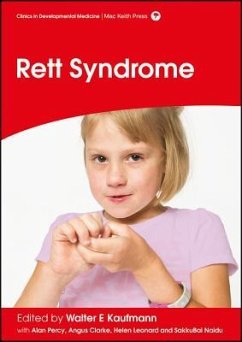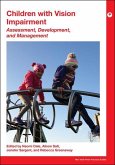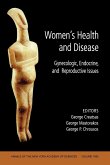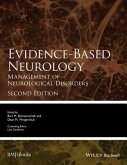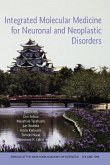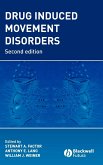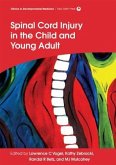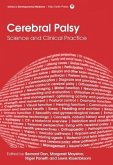Rett Syndrome
Herausgeber: Kaufmann, Walter
Rett Syndrome
Herausgeber: Kaufmann, Walter
- Gebundenes Buch
- Merkliste
- Auf die Merkliste
- Bewerten Bewerten
- Teilen
- Produkt teilen
- Produkterinnerung
- Produkterinnerung
Among the vast body of literature that has grown around Rett syndrome, this volume is the first to be aimed at both clinicians and researchers. It presents a comprehensive overview of the disorder and examines the areas where gaps in knowledge are most significant. Rett Syndrome is intended to be a guide for both initial examination and in-depth study of the disorder. It is a practical text for the physician approaching the disorder for the first time and a valuable reference resource for the specialist or researcher.
Andere Kunden interessierten sich auch für
![Children with Vision Impairment Children with Vision Impairment]() Children with Vision Impairment89,99 €
Children with Vision Impairment89,99 €![Women's Health and Disease Women's Health and Disease]() George CreatsasWomen's Health and Disease194,99 €
George CreatsasWomen's Health and Disease194,99 €![Evidence-Based Neurology Evidence-Based Neurology]() Evidence-Based Neurology174,99 €
Evidence-Based Neurology174,99 €![Integrated Molecular Medicine for Neuronal and Neoplastic Disorders, Volume 1086 Integrated Molecular Medicine for Neuronal and Neoplastic Disorders, Volume 1086]() Gen Sobue (ed.)Integrated Molecular Medicine for Neuronal and Neoplastic Disorders, Volume 1086169,99 €
Gen Sobue (ed.)Integrated Molecular Medicine for Neuronal and Neoplastic Disorders, Volume 1086169,99 €![Drug Induced Movement Disorders Drug Induced Movement Disorders]() Factor S.A. Stewart / Lang A. Anthony / Weiner W.J. WilliamDrug Induced Movement Disorders270,99 €
Factor S.A. Stewart / Lang A. Anthony / Weiner W.J. WilliamDrug Induced Movement Disorders270,99 €![Spinal Cord Injury in the Child and Young Adult Spinal Cord Injury in the Child and Young Adult]() Spinal Cord Injury in the Child and Young Adult183,99 €
Spinal Cord Injury in the Child and Young Adult183,99 €![Cerebral Palsy Cerebral Palsy]() Cerebral Palsy276,99 €
Cerebral Palsy276,99 €-
-
-
Among the vast body of literature that has grown around Rett syndrome, this volume is the first to be aimed at both clinicians and researchers. It presents a comprehensive overview of the disorder and examines the areas where gaps in knowledge are most significant. Rett Syndrome is intended to be a guide for both initial examination and in-depth study of the disorder. It is a practical text for the physician approaching the disorder for the first time and a valuable reference resource for the specialist or researcher.
Hinweis: Dieser Artikel kann nur an eine deutsche Lieferadresse ausgeliefert werden.
Hinweis: Dieser Artikel kann nur an eine deutsche Lieferadresse ausgeliefert werden.
Produktdetails
- Produktdetails
- Verlag: Wiley
- Seitenzahl: 240
- Erscheinungstermin: 3. Januar 2018
- Englisch
- Abmessung: 246mm x 180mm x 17mm
- Gewicht: 655g
- ISBN-13: 9781909962835
- ISBN-10: 190996283X
- Artikelnr.: 48924070
- Herstellerkennzeichnung
- Libri GmbH
- Europaallee 1
- 36244 Bad Hersfeld
- gpsr@libri.de
- Verlag: Wiley
- Seitenzahl: 240
- Erscheinungstermin: 3. Januar 2018
- Englisch
- Abmessung: 246mm x 180mm x 17mm
- Gewicht: 655g
- ISBN-13: 9781909962835
- ISBN-10: 190996283X
- Artikelnr.: 48924070
- Herstellerkennzeichnung
- Libri GmbH
- Europaallee 1
- 36244 Bad Hersfeld
- gpsr@libri.de
Walter Kaufmann is Director of the Center for Translational Research and Curry Chair in Genetic Therapeutics at the Greenwood Genetic Center, South Carolina, USA. He is a clinician and researcher whose career has focused on characterizing the neurobehavioral phenotypes and underlying mechanisms of genetic disorders associated with intellectual disability and autism. His focus is the development of novel therapies for these disorders, including outcome measures and biomarkers for the corresponding clinical trials. Dr Kaufmann has carried out most of this work at the Kennedy Krieger Institute and Harvard Medical School (Boston Childrens Hospital) USA. Alan Percy is a Professor in Child Neurology and currently the Interim Director of Clinical Neuroscience at the Civitan International Research Center, University of Alabama School of Medicine, Birmingham , USA. He trained in paediatrics at Stanford University Hospital and specialised in paediatric neurology at the Johns Hopkins University School of Medicine. Rett syndrome is his main interest. He has authored over 250 monographs, book chapters and journal articles. He is co-editor of the journal Translational Science of Rare Diseases and is on the Advisory Board of Rettsyndrome.org. Angus Clarke is Professor and Honorary Consultant in Clinical Genetics at the Institute of Medical Genetics, University Hospital of Wales, UK. He established the Cardiff University MSc course in Genetic Counselling in 2000 and has been Course Director since then. Professor Clarke has particular interest in Rett syndrome and ectodermal dysplasia, the genetic counselling process and the social and ethical issues around human genetics. He has authored or edited seven books and numerous research papers and book chapters. His is also medical advisor to Rett UK. Helen Leonard is Senior Research Fellow and Principal Research Fellow at the Telethon Kids Institute, Perth, Western Australia. In 1992 she established the internationally unique, population-based Australian Rett Syndrome Database and has maintained the register since that time. In 2002 she set up the International Rett Syndrome Foundation Phenotype Database, InterRett, which has now collected data on almost 2700 cases from 57 countries. Her international reputation has been built on over 200 peer-reviewed papers and 12 book chapters. Sakkubai Naidu works as a Pediatric Neurologist at Kennedy Krieger Institute where she also directs Rett syndrome research at the Department of Neurogenetics. Dr Naidu is also a Professor in the Departments of Neurology and Pediatrics at the Johns Hopkins University School of Medicine. Her special interest is in developmental and neurogenetic disorders affecting children and adults. Dr Naidu is a member of the American Academy of Neurology, Child Neurology Society, American Neurological Association, International Child Neurology Society, Neurological Society of India and the American Association for the Advancement of Science.
Authors' Appointments vii
Foreword xi
Bengt Hagberg : Leading the Way to Rett Syndrome Today xiii
A tribute by Dr Alan K Percy
Preface xv
Prologue: Personal Perspectives
My 'Rett' Story xvii
Bengt Hagberg
A Mother's Journey xix
Kathy Hunter
A Perspective from the British Isles xxii
Alison Kerr
1. The Diagnosis of Rett Syndrome 1
Walter E Kaufmann and Jeffrey L Neul
2. The Natural History of Rett Syndrome: Building on Recent Experience 14
Alan K Percy and Daniel G Glaze
3. The Clinical Genetics of Rett Syndrome 24
Hayley Archer, John Christodoulou and Angus Clarke
4. Genetic Sources of Variation in Rett Syndrome 41
Sonia Bjorum Brower, Helen Leonard, Francesca Mari, Alessandra Renieri and
Jeffrey L Neul
5. Cognition, Communication and Behavior in Individuals with Rett Syndrome
50
Gillian S Townend, Walter E Kaufmann, Peter B Marschik, Rosa Angela Fabio,
Jeff Sigafoos and Leopold MG Curfs
6. Motor Abnormalities in Rett Syndrome 62
Jenny Downs and Teresa Temudo
7. Orthopedic Isssues in Rett Syndrome 75
David P Roye Jr, Jenny Downs, Gordon Baikie and Brendan A Williams
8. Sleep Issues in Rett Syndrome 91
Daniel G Glaze, Sarojini Budden, Yoshiko Nomura and Carolyn Ellaway
9. Epilepsy in Rett Syndrome 103
Andreea Nissenkorn, Maria Pintaudi, Daniel G Glaze and Bruria Ben-Zeev
10. Breathing Abnormalities in Rett Syndrome 116
Jan Marino Ramirez, Christopher Scott Ward and Jeffrey L Neul
11. Growth, Feeding an Nutrition, an Bone Health in Rett Syndrome 125
Kathleen J Motil
12. Molecular Complexities of Mecp2 Function in Rett Syndrome 142
Michael L Gonzales and Janine M LaSalle
13. The Neuro Biology of Rett Syndrome 153
Walter E Kaufmann, James H Eubanks, Michael V Johnston and Mary E Blue
14. Treatments for Rett Syndrome: Prospects for Targeted Therapies 170
Wendy A Gold, SakkuBai Naidu and John Christodoulou
15. Rehabilitation in Rett Syndrome 198
Sarojini Budden
16. Perspectives in Rett Syndrome: Where We Are and Where We Should Go 210
Walter E Kaufmann, Alan K Percy, Angus Clarke, Helen Leonard and SakkuBai
Naidu
Index 217
Foreword xi
Bengt Hagberg : Leading the Way to Rett Syndrome Today xiii
A tribute by Dr Alan K Percy
Preface xv
Prologue: Personal Perspectives
My 'Rett' Story xvii
Bengt Hagberg
A Mother's Journey xix
Kathy Hunter
A Perspective from the British Isles xxii
Alison Kerr
1. The Diagnosis of Rett Syndrome 1
Walter E Kaufmann and Jeffrey L Neul
2. The Natural History of Rett Syndrome: Building on Recent Experience 14
Alan K Percy and Daniel G Glaze
3. The Clinical Genetics of Rett Syndrome 24
Hayley Archer, John Christodoulou and Angus Clarke
4. Genetic Sources of Variation in Rett Syndrome 41
Sonia Bjorum Brower, Helen Leonard, Francesca Mari, Alessandra Renieri and
Jeffrey L Neul
5. Cognition, Communication and Behavior in Individuals with Rett Syndrome
50
Gillian S Townend, Walter E Kaufmann, Peter B Marschik, Rosa Angela Fabio,
Jeff Sigafoos and Leopold MG Curfs
6. Motor Abnormalities in Rett Syndrome 62
Jenny Downs and Teresa Temudo
7. Orthopedic Isssues in Rett Syndrome 75
David P Roye Jr, Jenny Downs, Gordon Baikie and Brendan A Williams
8. Sleep Issues in Rett Syndrome 91
Daniel G Glaze, Sarojini Budden, Yoshiko Nomura and Carolyn Ellaway
9. Epilepsy in Rett Syndrome 103
Andreea Nissenkorn, Maria Pintaudi, Daniel G Glaze and Bruria Ben-Zeev
10. Breathing Abnormalities in Rett Syndrome 116
Jan Marino Ramirez, Christopher Scott Ward and Jeffrey L Neul
11. Growth, Feeding an Nutrition, an Bone Health in Rett Syndrome 125
Kathleen J Motil
12. Molecular Complexities of Mecp2 Function in Rett Syndrome 142
Michael L Gonzales and Janine M LaSalle
13. The Neuro Biology of Rett Syndrome 153
Walter E Kaufmann, James H Eubanks, Michael V Johnston and Mary E Blue
14. Treatments for Rett Syndrome: Prospects for Targeted Therapies 170
Wendy A Gold, SakkuBai Naidu and John Christodoulou
15. Rehabilitation in Rett Syndrome 198
Sarojini Budden
16. Perspectives in Rett Syndrome: Where We Are and Where We Should Go 210
Walter E Kaufmann, Alan K Percy, Angus Clarke, Helen Leonard and SakkuBai
Naidu
Index 217
Authors' Appointments vii
Foreword xi
Bengt Hagberg : Leading the Way to Rett Syndrome Today xiii
A tribute by Dr Alan K Percy
Preface xv
Prologue: Personal Perspectives
My 'Rett' Story xvii
Bengt Hagberg
A Mother's Journey xix
Kathy Hunter
A Perspective from the British Isles xxii
Alison Kerr
1. The Diagnosis of Rett Syndrome 1
Walter E Kaufmann and Jeffrey L Neul
2. The Natural History of Rett Syndrome: Building on Recent Experience 14
Alan K Percy and Daniel G Glaze
3. The Clinical Genetics of Rett Syndrome 24
Hayley Archer, John Christodoulou and Angus Clarke
4. Genetic Sources of Variation in Rett Syndrome 41
Sonia Bjorum Brower, Helen Leonard, Francesca Mari, Alessandra Renieri and
Jeffrey L Neul
5. Cognition, Communication and Behavior in Individuals with Rett Syndrome
50
Gillian S Townend, Walter E Kaufmann, Peter B Marschik, Rosa Angela Fabio,
Jeff Sigafoos and Leopold MG Curfs
6. Motor Abnormalities in Rett Syndrome 62
Jenny Downs and Teresa Temudo
7. Orthopedic Isssues in Rett Syndrome 75
David P Roye Jr, Jenny Downs, Gordon Baikie and Brendan A Williams
8. Sleep Issues in Rett Syndrome 91
Daniel G Glaze, Sarojini Budden, Yoshiko Nomura and Carolyn Ellaway
9. Epilepsy in Rett Syndrome 103
Andreea Nissenkorn, Maria Pintaudi, Daniel G Glaze and Bruria Ben-Zeev
10. Breathing Abnormalities in Rett Syndrome 116
Jan Marino Ramirez, Christopher Scott Ward and Jeffrey L Neul
11. Growth, Feeding an Nutrition, an Bone Health in Rett Syndrome 125
Kathleen J Motil
12. Molecular Complexities of Mecp2 Function in Rett Syndrome 142
Michael L Gonzales and Janine M LaSalle
13. The Neuro Biology of Rett Syndrome 153
Walter E Kaufmann, James H Eubanks, Michael V Johnston and Mary E Blue
14. Treatments for Rett Syndrome: Prospects for Targeted Therapies 170
Wendy A Gold, SakkuBai Naidu and John Christodoulou
15. Rehabilitation in Rett Syndrome 198
Sarojini Budden
16. Perspectives in Rett Syndrome: Where We Are and Where We Should Go 210
Walter E Kaufmann, Alan K Percy, Angus Clarke, Helen Leonard and SakkuBai
Naidu
Index 217
Foreword xi
Bengt Hagberg : Leading the Way to Rett Syndrome Today xiii
A tribute by Dr Alan K Percy
Preface xv
Prologue: Personal Perspectives
My 'Rett' Story xvii
Bengt Hagberg
A Mother's Journey xix
Kathy Hunter
A Perspective from the British Isles xxii
Alison Kerr
1. The Diagnosis of Rett Syndrome 1
Walter E Kaufmann and Jeffrey L Neul
2. The Natural History of Rett Syndrome: Building on Recent Experience 14
Alan K Percy and Daniel G Glaze
3. The Clinical Genetics of Rett Syndrome 24
Hayley Archer, John Christodoulou and Angus Clarke
4. Genetic Sources of Variation in Rett Syndrome 41
Sonia Bjorum Brower, Helen Leonard, Francesca Mari, Alessandra Renieri and
Jeffrey L Neul
5. Cognition, Communication and Behavior in Individuals with Rett Syndrome
50
Gillian S Townend, Walter E Kaufmann, Peter B Marschik, Rosa Angela Fabio,
Jeff Sigafoos and Leopold MG Curfs
6. Motor Abnormalities in Rett Syndrome 62
Jenny Downs and Teresa Temudo
7. Orthopedic Isssues in Rett Syndrome 75
David P Roye Jr, Jenny Downs, Gordon Baikie and Brendan A Williams
8. Sleep Issues in Rett Syndrome 91
Daniel G Glaze, Sarojini Budden, Yoshiko Nomura and Carolyn Ellaway
9. Epilepsy in Rett Syndrome 103
Andreea Nissenkorn, Maria Pintaudi, Daniel G Glaze and Bruria Ben-Zeev
10. Breathing Abnormalities in Rett Syndrome 116
Jan Marino Ramirez, Christopher Scott Ward and Jeffrey L Neul
11. Growth, Feeding an Nutrition, an Bone Health in Rett Syndrome 125
Kathleen J Motil
12. Molecular Complexities of Mecp2 Function in Rett Syndrome 142
Michael L Gonzales and Janine M LaSalle
13. The Neuro Biology of Rett Syndrome 153
Walter E Kaufmann, James H Eubanks, Michael V Johnston and Mary E Blue
14. Treatments for Rett Syndrome: Prospects for Targeted Therapies 170
Wendy A Gold, SakkuBai Naidu and John Christodoulou
15. Rehabilitation in Rett Syndrome 198
Sarojini Budden
16. Perspectives in Rett Syndrome: Where We Are and Where We Should Go 210
Walter E Kaufmann, Alan K Percy, Angus Clarke, Helen Leonard and SakkuBai
Naidu
Index 217

